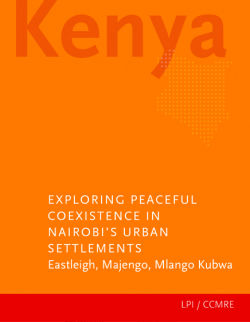Publications & reports
Exploring Peaceful Coexistence in Nairobi’s Urban Settlements
Eastleigh, Majengo, Mlango Kubwa
This report is the result of a nine-month qualitative research project, designed and conducted by the Life & Peace Institute in partnership with the Centre for Christian-Muslim Relations in Eastleigh. The uniqueness of this research project owes to the fact that it was inherently designed and implemented as a peacebuilding process in itself, by creating space for dialogue between individuals from different ethnic, religious and gender backgrounds. The report sheds light on community perspectives of peace and security related issues in urban settlements in Kenya.

- Date
- Type
- Report
- Country/Region
- Kenya
Life & Peace Institute (LPI) and the Centre for Christian-Muslim Relations in Eastleigh (CCMRE) would like to acknowledge all the contributions to this research, without which the preparation of this publication would not have been possible.
Summary
Rapid and large-scale urbanisation has been changing the face of urban landscapes on the African continent. Despite emerging opportunities – such as increasing access to education, health and transport infrastructures – entrenched urban socio-economic challenges related to (amongst others) high levels of poverty, unemployment and high population density, have yet to be overcome. Rapid urban development has concomitantly led to the formation of increasingly diverse urban settlements, confined geographical locations, hosting populations from multiple socio-cultural, religious, ethnic and national backgrounds. The two areas of Kenya’s capital that were targeted by this pilot research – two sub-administration units of Kamukunji Sub-County and one sub-administration of Mathare Sub-County of Nairobi, illustrate these prominent dynamics.
For this research, the Life & Peace Institute (LPI) and the Centre for Christian- Muslim Relations in Eastleigh (CCMRE) engaged a wide range of community and state actors and adopted a refined analytical framework to enable the identification of community priorities and pressing needs that go beyond dealing with “harder” security issues, and put emphasis on the importance of strengthening existing community resilience and capacities for peace. One strong recommendation from the participants for instance, has been that religious leaders should be encouraged and facilitated to take a much more proactive role in promoting cohesion across religious communities. Youth were identified as a group that is insufficiently supported and empowered by their communities and the state and therefore at risk of being negatively influenced, or mobilised.
LPI is currently supporting two change processes in collaboration with Kenyan civil society organisations CCMRE and the Eastleighwood Youth Forum (EYF). Earlier this year, LPI in partnership with EYF launched an urban youth dialogue to action project entitled, “Tubonge Mtaani” (translated as “Let’s talk in the ‘hood”), where youth moderators have been trained to facilitate groups comprising diverse young women and men to meet regularly and engage in transformational dialogue over time. This Sustained Dialogue approach goes beyond discussion and exchange; further along into the process, the dialogue groups will engage in scenario-building to identify proactive steps and positive solutions for the pressing issues that have been discussed, as well as taking action together to move forward with the implementation of tailored solutions.
This publication and the initiatives building on its findings would not have been possible without the facilitation and participation of the communities in Eastleigh, Majengo and Mlango Kubwa. My sincere appreciation is therefore directed to these actors, for past and future efforts to promote peaceful coexistence in their areas, and in Kenya at large.
Charlotte Booth - Programme Director